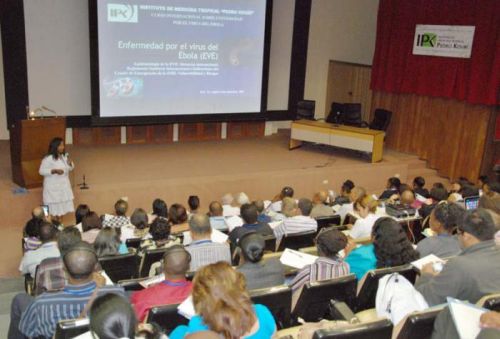With the presence of a hundred participants from 19 countries in Latin America and the Caribbean, the first International Course for preventing and fighting the Ebola virus started in Havana.
Steer health personnel assigned to the epidemiological surveillance of this and other hemorrhagic fevers of viral origin, to the prevention and control is one of the objectives of the meeting in session until Friday at the Institute of Tropical Medicine Pedro Kouri .
Epidemiology of Ebola disease, clinical management, diagnosis, biosafety services organization, human factors in severe epidemics, social media, are some of the themes that shape the agenda of the event, told Prensa Latina Madelyn Garcés, an epidemiologist at the IPK and one of the course coordinators.
He explained that in addition to receiving conference keynote during the week participants will work on the firing training of IPK, visit the segregation unit, and perform practical exercises of dressing and undressing with personal protective equipment.
In the opening session, Marieta Cutiño Cuban Deputy Minister of Public Health (Minsap) recalled that the initiative is a result of the technical meeting of experts and managers for the prevention of the epidemic, which was held in Cuba on 29 and 30 October last.
Noted that among those attending the course, in addition to foreign professionals, are specialists of Cuban medical brigades settled in Venezuela, Ecuador, Brazil, Bolivia, Guatemala, Trinidad and Tobago, and Mozambique. They also assist professionals Unity Medical Center Collaboration, the Civil Defense and the Interior Ministry.
For his part, Jorge Pérez Ávila, director of the IPK, after making a brief account of the beginning and foundation of the institution, referred to the situation with the Ebola virus, which has caused more than 13 thousand patients, with a high mortality Between 50 and 60 percent of cases.
The international situation of the disease is considered a public health emergency of international importance, with real chances of spreading to other geographic areas and countries. Nobody is exempt from danger, said Dr. Pérez Ávila.
In addition to completing the course, the technical meeting set out to develop a series of actions, among which the relevance of establishing epidemiological surveillance centers for these purposes by people from areas of transmission, with the risk of having acquired disease.
It also includes the proposal to strengthen the surveillance system of the country and its articulation with the National Center Liaison to the International Health Regulations (IHR), with the aim of strengthening national and regional responses appropriate.
Strengthen relationships sectoral level border for more complete information about ships, crews and travelers arriving in the country and promote the process of certifying the RSI at points of entry, are among the proposals.
Systematic exchange of experiences and lessons learned in addressing the Ebola among the countries of the region defined by each country in cooperation with the Organization Pan American Health Organization (PAHO), the entire route to ensure critical shipping samples to reference laboratories international.
The meeting shows the willingness of the countries in the region to work together in confronting the epidemic that has claimed nearly five thousand lives in West Africa.
 Escambray ENGLISH EDITION
Escambray ENGLISH EDITION






Escambray reserves the right to publish comments.